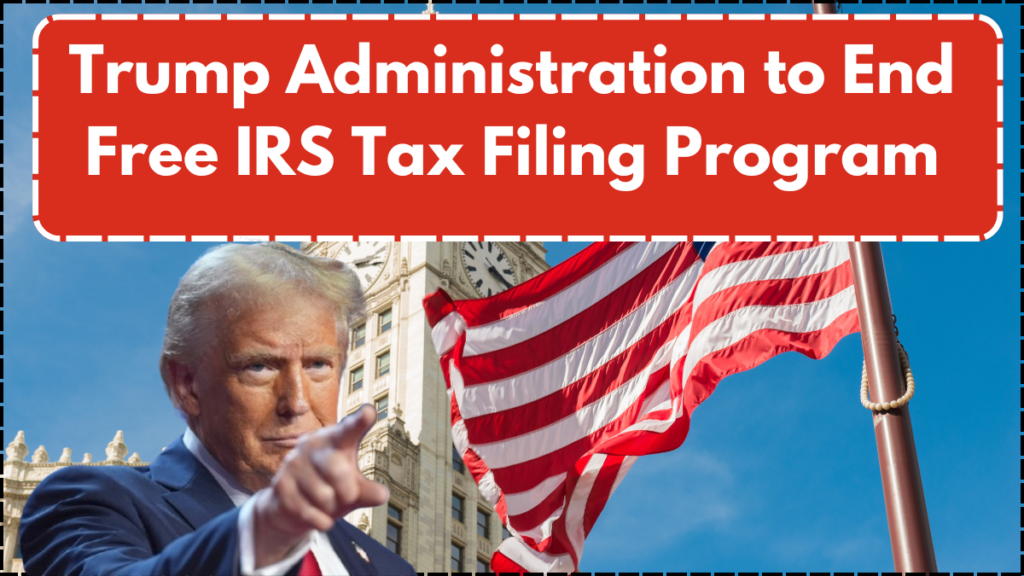The IRS Direct File program, a free government-run service designed to simplify the tax filing process for millions of Americans, has been officially terminated by the Trump administration. Launched in 2024, this initiative provided a seamless, no-cost filing option for eligible taxpayers. With its cancellation, many Americans are now facing higher costs and fewer filing options. This article will explore the reasons behind the program’s termination, its implications for taxpayers, and alternative solutions available for filing taxes.

What Was the IRS Direct File Program?
The IRS Direct File program was a web-based platform designed to offer a free tax filing solution for eligible taxpayers with simple federal returns. The tool was launched as part of a broader modernization initiative for the IRS, which also sought to improve government efficiency after the Inflation Reduction Act of 2022 allocated significant funding to the agency.
Eligible users could file basic federal returns without paying for commercial tax software or hiring professional tax preparers. The service was user-friendly, providing an intuitive interface that allowed people to file their taxes with ease. Additionally, the platform ensured data security, adhering to government standards, and offered real-time support through IRS chat agents during its pilot season.
Key features of the IRS Direct File program included:
-
Simple and easy-to-use interface: Designed for users without advanced tax knowledge.
-
No upsells or hidden fees: The service was free of charge.
-
Government-controlled data security: Ensured privacy for taxpayers.
-
Real-time support: Helped users resolve issues quickly during the filing process.
Why Was the IRS Direct File Program Terminated?
The termination of the IRS Direct File program was driven by several factors, some of which remain contentious. While the Trump administration argued that the program was inefficient and redundant, critics suggest that political motivations and lobbying from private tax preparation companies may have played a significant role in its cancellation.
Political and Industry Pressures
-
Cost Concerns: The Trump administration claimed that the program was inefficient, noting overlaps with other free services such as IRS Free File and commercial tax tools. However, many argue that the decision was influenced by political factors and lobbying from companies such as TurboTax and H&R Block, which have long opposed government-run tax filing systems.
-
Industry Influence: Major tax preparation companies spent significant resources lobbying against the Direct File program. Their opposition was driven by the potential loss of business, as millions of taxpayers stood to benefit from a free, government-provided service. Critics argue that the termination of the program serves the interests of these corporations rather than the American public.
-
Defunding of Public Services: Under the leadership of Elon Musk at the Department of Government Efficiency, several public digital services, including the IRS Direct File program, were defunded. Musk cited inefficiencies in government-run initiatives and suggested that the private sector could manage these services more effectively.
How Will the Termination of IRS Direct File Impact Taxpayers?
The shutdown of the IRS Direct File program will have several implications for taxpayers, particularly those who benefited from its no-cost service. Here’s how Americans will be affected:
Higher Costs for Taxpayers
With the removal of the free IRS Direct File program, taxpayers will need to use paid tax preparation services or software. According to the National Society of Accountants, the average cost of a professionally prepared tax return was $220 in 2023. In addition, many online tax software platforms have hidden fees or upsells that can increase the total cost of filing.
Reduced Access for Low-Income Households
The Direct File program was particularly beneficial for individuals and families earning under $73,000. These taxpayers often struggle with the costs associated with commercial software or hiring tax professionals. The elimination of this free filing option reduces access for these low- and moderate-income households, potentially leaving them with fewer affordable filing options.
Increased Data Privacy Risks
Filing taxes through third-party commercial platforms increases the risk of third-party tracking, data breaches, and the sale of personal data to advertisers. Unlike these private vendors, the IRS Direct File program kept taxpayer information secure within the government system, offering an added layer of privacy and control over personal data.
What Are Your Remaining Options for Filing Taxes?
Although the IRS Direct File program has been discontinued, several alternatives are available for taxpayers to file their taxes:
1. IRS Free File
The IRS continues to offer Free File, a program in partnership with commercial tax software providers like TaxAct and FreeTaxUSA. This option is available for individuals earning under $73,000 annually. However, users should be aware of potential upsells and confusing interfaces, which can detract from the program’s accessibility.
2. Volunteer Income Tax Assistance (VITA)
The VITA program provides free, in-person tax assistance for eligible individuals, including those earning under $60,000 annually, seniors, people with disabilities, and non-English speakers. This program remains a valuable resource for those who need help with filing their taxes.
3. Commercial Tax Software with Discounts
Some tax software providers offer free filing options, particularly early in the tax season. However, users should be cautious of tier upgrades and hidden charges that may arise later in the filing process. Always read the fine print to avoid unexpected fees.
Expert Opinions on the Shutdown
Nina Olson, the former IRS National Taxpayer Advocate, expressed disappointment over the program’s termination, stating, “We’ve taken one step forward, two steps back.” Many consumer advocacy organizations, including Public Citizen and the Economic Security Project, have criticized the move, arguing that it undermines trust in government services and benefits the tax preparation monopolies at the expense of everyday Americans.
Conclusion: The Future of Tax Filing
The end of the IRS Direct File program marks a significant shift in how Americans file their taxes. While this decision may have short-term savings for the government, the long-term effects on taxpayers could be far-reaching, particularly for lower-income households. As taxpayers face higher costs and fewer free options, it’s essential to remain informed about available alternatives and advocate for policies that make tax filing simpler and more accessible for everyone.
FAQ
What was the IRS Direct File program?
The IRS Direct File program was a free, government-managed tool that allowed eligible taxpayers to file their federal taxes directly with the IRS. It was available for simple tax returns and offered an easy-to-use, secure filing process.
Why was the IRS Direct File program terminated?
The program was terminated due to political pressure, lobbying from commercial tax prep companies, and budget cuts. Critics argue that the decision was influenced by private sector interests rather than concerns about efficiency or cost.
What are the alternatives to the IRS Direct File program?
Taxpayers can still use IRS Free File, the VITA program for in-person assistance, or commercial tax software providers, many of which offer discounted or free basic filing options.
How will the termination of IRS Direct File affect taxpayers?
The shutdown of the program will result in higher costs for tax filing, particularly for low-income individuals. It also increases the risk of data privacy issues, as more people will need to rely on third-party services for their filings.
Is there any way to file taxes for free now?
Yes, the IRS Free File program and VITA are still available for eligible taxpayers. Additionally, some commercial software providers offer free filing, especially early in the tax season.
For More Information Click Here
Pari is a passionate writer known for captivating stories that blend imagination and reality. Inspired by travel, history, and everyday moments, Pari crafts narratives that resonate deeply with readers.




